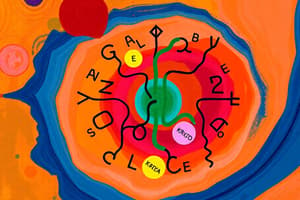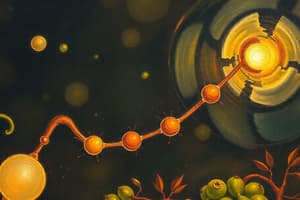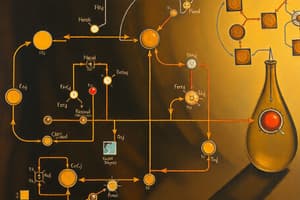Podcast
Questions and Answers
What role does cortisol play in glucose metabolism?
What role does cortisol play in glucose metabolism?
- Stimulates glycogen synthesis
- Inhibits gluconeogenesis
- Stimulates gluconeogenesis (correct)
- Enhances insulin sensitivity
What triggers the immediate release of glucose during stress?
What triggers the immediate release of glucose during stress?
- Somatomedins activity
- Insulin secretion
- Epinephrine production (correct)
- Cortisol release
How does human placental lactogen (hPL) affect blood sugar levels?
How does human placental lactogen (hPL) affect blood sugar levels?
- Promotes insulin secretion
- Increases insulin sensitivity
- Has anti-insulin activity (correct)
- Decreases blood sugar levels
What is the function of somatomedins in glucose metabolism?
What is the function of somatomedins in glucose metabolism?
What effect does adrenocorticotropic hormone (ACTH) have on glucose levels?
What effect does adrenocorticotropic hormone (ACTH) have on glucose levels?
What is the primary result of glycolysis?
What is the primary result of glycolysis?
Which metabolic pathway involves the synthesis of excess glucose into glycogen?
Which metabolic pathway involves the synthesis of excess glucose into glycogen?
What is the main energy-producing pathway in metabolic processes?
What is the main energy-producing pathway in metabolic processes?
Which process converts non-carbohydrate sources into carbohydrate substrates?
Which process converts non-carbohydrate sources into carbohydrate substrates?
Which substances can be converted into glucose through interconversion in the liver?
Which substances can be converted into glucose through interconversion in the liver?
What is the role of liver cells in fructose metabolism?
What is the role of liver cells in fructose metabolism?
What are the end products of galactose and fructose metabolism in the liver?
What are the end products of galactose and fructose metabolism in the liver?
Which process is primarily regulated by glucagon?
Which process is primarily regulated by glucagon?
What is the primary role of fructokinase in carbohydrate metabolism?
What is the primary role of fructokinase in carbohydrate metabolism?
Why does hexokinase preferentially phosphorylate glucose over fructose?
Why does hexokinase preferentially phosphorylate glucose over fructose?
What symptom is commonly associated with fructosuria?
What symptom is commonly associated with fructosuria?
What condition results from a lack of aldolase in the body?
What condition results from a lack of aldolase in the body?
Which of the following is a characteristic of galactose metabolism disorders?
Which of the following is a characteristic of galactose metabolism disorders?
What is a potential consequence of untreated galactosemia?
What is a potential consequence of untreated galactosemia?
What dietary change is essential for managing galactosemia?
What dietary change is essential for managing galactosemia?
What happens to excess glycogen in the body?
What happens to excess glycogen in the body?
What symptom might infants experience following sucrose intake in the case of fructose intolerance?
What symptom might infants experience following sucrose intake in the case of fructose intolerance?
Which enzyme initiates glycogenolysis in the presence of hypoglycemia?
Which enzyme initiates glycogenolysis in the presence of hypoglycemia?
Which hormone promotes hepatic glycogenolysis and gluconeogenesis?
Which hormone promotes hepatic glycogenolysis and gluconeogenesis?
What form of glycogen storage can be released slowly, typically found in muscle tissue?
What form of glycogen storage can be released slowly, typically found in muscle tissue?
What is a common symptom of glycogen storage diseases?
What is a common symptom of glycogen storage diseases?
Which hormone inhibits the secretion of both insulin and glucagon?
Which hormone inhibits the secretion of both insulin and glucagon?
What substance is produced when glycogen is broken down in the liver?
What substance is produced when glycogen is broken down in the liver?
Which hormone antagonizes insulin and stimulates gluconeogenesis through lipolysis?
Which hormone antagonizes insulin and stimulates gluconeogenesis through lipolysis?
Flashcards
Glycogen Storage
Glycogen Storage
The process of storing glucose as glycogen in the liver and muscle cells. All cells can store some glycogen, but the liver and muscle cells are the primary storage sites.
Free Glycogen
Free Glycogen
Glycogen that is readily released from the liver, making it immediately available for energy production.
Fixed Glycogen
Fixed Glycogen
Glycogen stored in the muscle cells that is released slowly, providing a sustained source of energy.
Glycogenolysis
Glycogenolysis
Signup and view all the flashcards
Phosphorylase
Phosphorylase
Signup and view all the flashcards
Glucagon & Epinephrine
Glucagon & Epinephrine
Signup and view all the flashcards
Insulin
Insulin
Signup and view all the flashcards
Glucagon
Glucagon
Signup and view all the flashcards
Cortisol
Cortisol
Signup and view all the flashcards
Epinephrine and Norepinephrine
Epinephrine and Norepinephrine
Signup and view all the flashcards
Human Placental Lactogen (hPL)
Human Placental Lactogen (hPL)
Signup and view all the flashcards
ACTH (Adrenocorticotropic Hormone)
ACTH (Adrenocorticotropic Hormone)
Signup and view all the flashcards
Somatomedins
Somatomedins
Signup and view all the flashcards
Glycolysis
Glycolysis
Signup and view all the flashcards
Gluconeogenesis
Gluconeogenesis
Signup and view all the flashcards
Pentose Phosphate Pathway
Pentose Phosphate Pathway
Signup and view all the flashcards
Kreb's Cycle
Kreb's Cycle
Signup and view all the flashcards
Fructose Metabolism
Fructose Metabolism
Signup and view all the flashcards
Transdeamination
Transdeamination
Signup and view all the flashcards
Fructokinase
Fructokinase
Signup and view all the flashcards
Hexokinase
Hexokinase
Signup and view all the flashcards
Aldolase
Aldolase
Signup and view all the flashcards
Fructosuria
Fructosuria
Signup and view all the flashcards
Fructose Intolerance
Fructose Intolerance
Signup and view all the flashcards
Galactokinase
Galactokinase
Signup and view all the flashcards
Galactose-1-phosphate uridyl transferase
Galactose-1-phosphate uridyl transferase
Signup and view all the flashcards
Galactosemia
Galactosemia
Signup and view all the flashcards
Study Notes
Metabolic Pathways
- Glucose is used to create energy (ATP) through various pathways.
- Glycolysis (Embden-Meyerhof Pathway): Breaks down glucose to form pyruvate, releasing ATP.
- Glycogenesis: Converts non-glucose hexoses (mannose, fructose, galactose) into glucose.
- Glycogenesis: Synthesizes excess glucose into glycogen.
- Glycogenolysis: Breaks down glycogen into glucose.
- Pentose Phosphate Pathway (Hexose Monophosphate Shunt/ Phosphogluconate Oxidative Pathway): Alternative pathway catabolizing glucose to produce ATP.
- Krebs Cycle (Citric Acid Cycle/ Tricarboxylic Acid Cycle): Main pathway producing ATP.
- Gluconeogenesis: Converts non-carbohydrate sources (amino acids, glycerol, lactate) into glucose to produce ATP.
- Transdeamination: Removes and transfers amino groups. Example: Alanine + a-ketoglutarate → Pyruvate + Glutamate; Pyruvate and Glutamate are Krebs Cycle substrates. Another example: Aspartate + a-ketoglutarate → oxaloacetate + glutamate.
Interconversion Between Monosaccharides in the Liver
- Most human tissues cannot utilize galactose and fructose directly, requiring glycogenesis.
- Liver cells contain enzymes for converting galactose, fructose, and mannose into glucose.
- The end products of galactose and fructose metabolism are glucose-6-phosphate, which converts to glucose.
- Liver, kidneys, intestines, and adipose tissue can use fructose as an energy source.
- Fructokinase phosphorylates fructose to fructose-1-phosphate (fructose-1-P).
- Hexokinase has higher affinity for glucose than fructose.
- Fructose-1,6-diphosphate produces glyceraldehyde-3-P and dihydroxyacetone phosphate.
Clinical Significance of Fructose
- Fructosuria: Inability to absorb fructose, causing fructose excretion in urine. Symptoms are benign.
- Fructose intolerance: Lack of aldolase, inhibiting glycogenolysis and gluconeogenesis. Prolonged fructose intake in infants can cause vomiting, poor feeding, jaundice, hepatic failure, and potentially death.
Galactose Metabolism
- Galactose is obtained from milk sugar.
- Liver and red blood cells (RBCs) are crucial in galactose metabolism.
- Galactosemia: Defect in galactose-1-phosphate uridyl transferase or galactokinase, leading to the trapping of galactose-1-phosphate in liver cells and RBCs.
- Symptoms of galactosemia can include hepatomegaly, impaired liver function, and mental retardation.
Glycogen Metabolism
- Glycogenesis: Liver and muscle cells primarily store glucose as glycogen.
- Glycogenolysis: Breakdown of glycogen into glucose, primarily in the liver and, to a slower extent in muscle.
- Free glycogen (liver) can readily be released, while fixed glycogen (muscle) is released more slowly.
- Excess glycogen storage can lead to fat production.
- Enzymes like phosphorylase and amylo-1,6-glucosidase are involved in glycogenolysis.
- The process produces glucose-6-phosphate which is turned into glucose from the blood.
Hormonal Regulation of Blood Sugar
- Glucagon and epinephrine regulate blood glucose levels via glycogenolysis and gluconeogenesis.
- Insulin promotes glucose uptake in various tissues.
- Other hormones including somatostatin, growth hormone, cortisol and others influence blood sugar levels. These further include the roles of thyroid hormone (TH) (thyroxine/tetraiodothyronine)), and cortisol and corticosteroid.
Studying That Suits You
Use AI to generate personalized quizzes and flashcards to suit your learning preferences.




